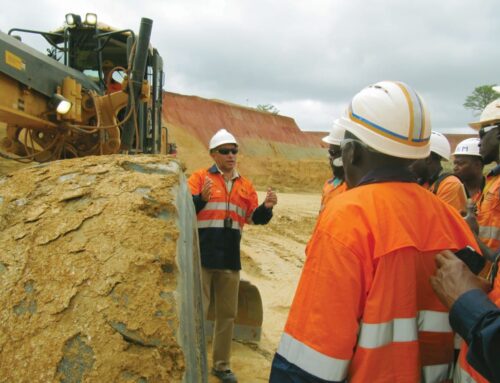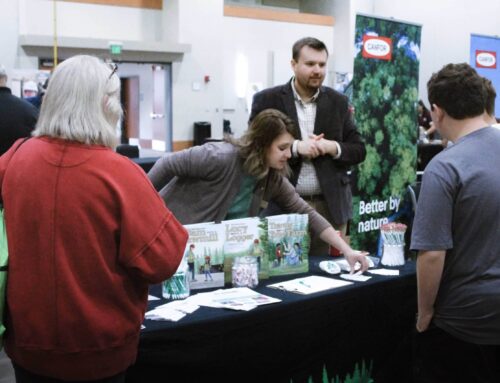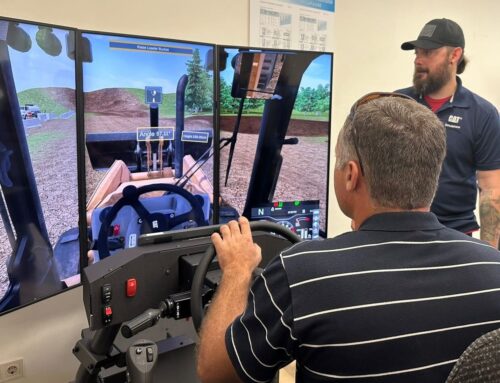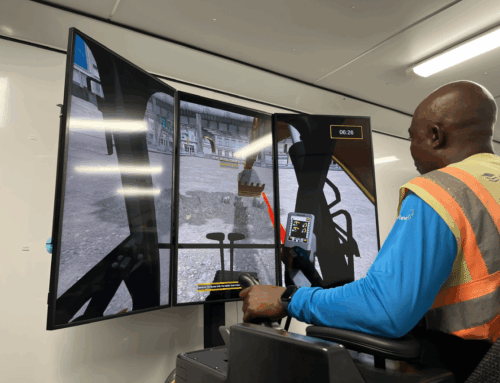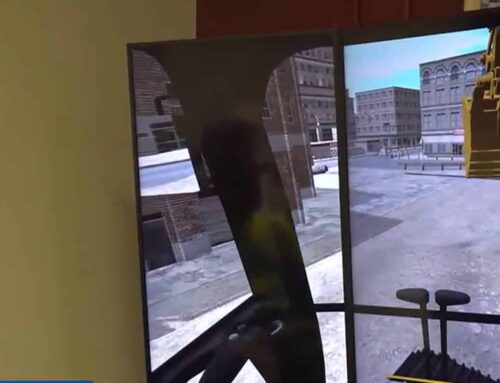Anne Marie Pham grew up helping her father with his “messiest” home renovation projects.
“I’ve always been interested in dirty jobs,” says Pham, a 21-year-old student in the Heavy Equipment Operator training class at Lowell Correctional Institution in Ocala, Florida. “When my counselor at Lowell Main Unit asked me if I wanted to learn to drive a forklift, I couldn’t say yes fast enough.”
Before she was incarcerated, Pham worked as a manicurist and nail tech. She’s hopeful that the training will lead to a job after she’s released. “Driving forklifts or an excavator can easily give me $30,000 to $40,000 a year. The skills are in demand.”
The Heavy Equipment Operator program received new funding in 2020 by the Florida Foundation of Correctional Excellence (FFCE), the Direct Support Organization for the Florida Department of Corrections. The aim was to reduce prison recidivism and improve public safety by providing job training, referrals to partner employers and career opportunities to incarcerated people enrolled in re-entry programs in Florida state prisons.
FFCE provides Cat® Simulators Systems to train students to operate excavators, lifts and compact track loaders. By providing hands-on training for in-demand skills, the program provides participants with an invaluable resource – the possibility of gainful employment upon release.
And it’s working. Many of the program’s participants find work within months of graduating, according to instructors.
“Women represent only 12% of the construction and heavy equipment industry,” says Angela Mesloh, one of the program’s instructors. “With the right skills, the field is wide open. Of the eight graduates who transferred to Orlando last month, five are already employed.”
In Florida, 85% of the prison population will return to the community. Many returnees are starting life over with nothing. Finding jobs, transportation, healthcare and housing pose significant challenges. Employers are hesitant to hire, even though they can receive federal tax credits for hiring ex-prisoners. The stigma of prison casts a long shadow, leading to joblessness, homelessness and eventual recidivism.
Skills training programs like this one can provide former prisoners with financial stability and leading to successful life and reintegration back to communities after release.
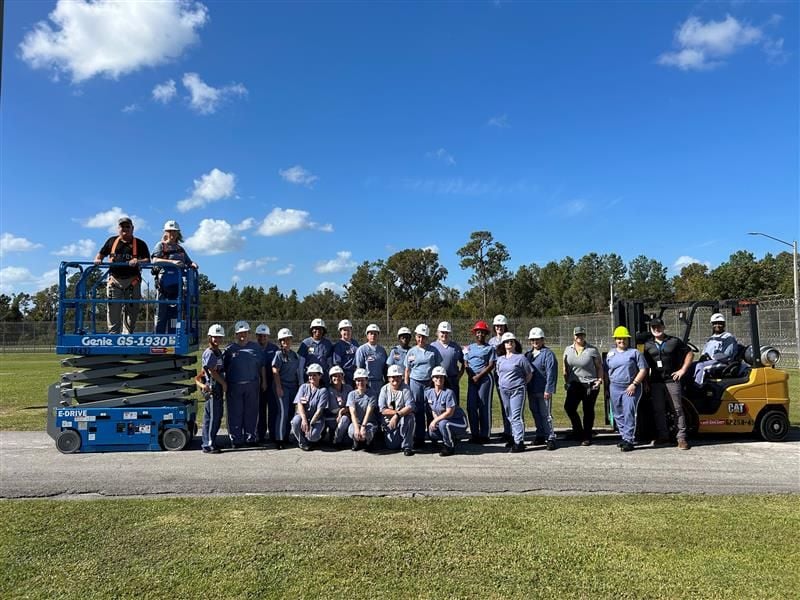
Lashawnda Williams, 45, was a nurse before prison, but knows that she will never be able to work in healthcare again. She worried about how she would support herself and her son, who has special needs. Williams says she feels a renewed confidence since enrolling in the course.
“I feel empowered listening to Ms. Mesloh talk about jobs,” says Williams. “She opened my eyes to what the future can hold for me. One day, I’ll be able to show my son, Cecil, a road or new building and say, ‘Mommy helped build this.’”
Industry leaders echo the need for skilled workers. Kevin Robbins, CEO of Ring Power, a private sales and rental company for Caterpillar machines, noticed a decline in sales and rentals, so he called customers to investigate. The same response came over and over: There were not enough heavy equipment operators to fill demand.
Identifying the opportunity in the program at Lowell, Robbins contacted FFCE and invested $200,000 in the class. The company loaned a mini-excavator, a forklift and a scissor lift to the program. Ring Power also has a networking site that matches potential employers with graduates who need jobs upon release.
After completing 900 hours of classroom lectures, testing and simulator training, students get hands-on experience operating machines during practical workshops. “The simulators were so realistic,” Pham says. “When I drove my first forklift, the transition was easy.”
Students selected for the program are within two years of release from prison. They can graduate in eight months to a year. FFCE continues to support graduates who transfer to the Orlando Work Release Center by funding paid apprenticeship positions with employers and offering short-term loans to help people purchase work clothes and tools.
Williams initially worried she was too old to learn a new trade. “On my first day in the program, I questioned whether I was crazy to be in this class,” she says. “How could I work with these huge machines?”
Still, she persevered. “I’m willing to do anything for my son, so I kept attending.”
Williams is now certified to operate forklifts, counterbalanced lift trucks and scissor lifts. She hopes to gain even more training to work with road building equipment, and to access small loans from the foundation to buy work clothing, rent and food.
She shows her diploma and flips through photos from a recent workshop. “That’s me operating an aerial platform!” she says.
A few months before her scheduled release, Williams secured a Zoom interview with Florida Road Builders. She was hired for a full-time job with benefits, earning $73,000 a year.
The school day begins with a safety meeting. Mesloh assigns a different student as the daily foreman of the project. A jobs sheet is passed around so the students know their assignments. The foreman runs through the daily goals and expectations. A short presentation is given on OSHA safety regulations and best practices.
“I require students to follow the same rules as they would on a real job site. If a student is scheduled for simulator time, they must wear a hardhat,” Mesloh says. She also requires random urinalysis drug screens.
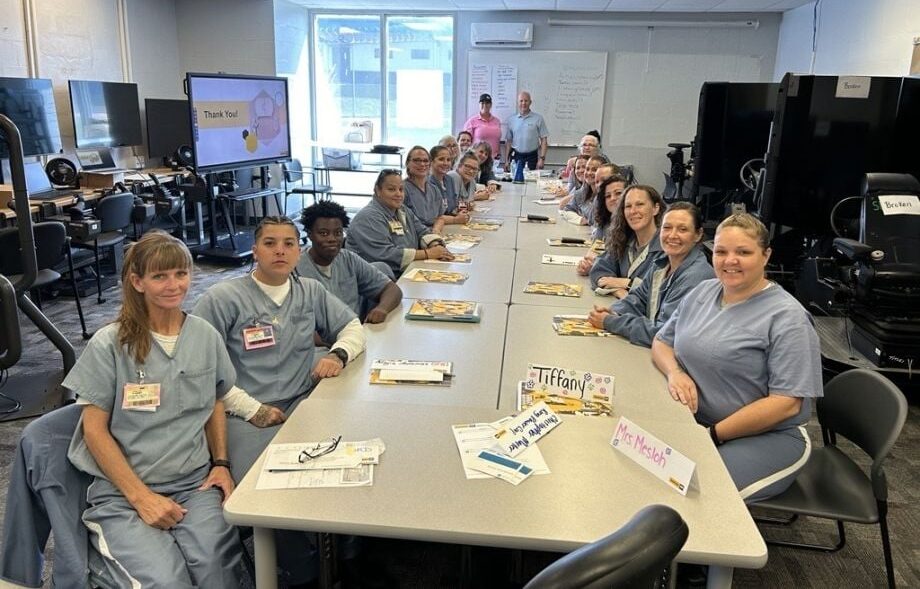
Students receive training in soft skills covering on the job communication, budgeting, financial planning and practice job interviews. Mesloh hands out mock paychecks and mock bills to help coach students through personal finance.
“Ten years ago, I never had to worry about bills,” says program participant Niajia Adames, 29. “I’ve spent a decade inside and there will be more responsibilities I’ll face as an adult and a heavy equipment operator.”
The simulators record the work hours as the students complete jobs. Base pay is calculated by experience. For every 25 hours Adames is in the simulator, she gets a pay increase. “Each test I pass equals a raise of $1,000. Ms. Mesloh prints out a receipt at the end of the day so I can see how my accomplishments are rewarded,” Adames says. “We also get fined for accidents or not complying with OSHA standards. If I’m caught without my hardhat on, the teacher fines me $250.”
Mary “Marty” Easterbrook graduated in spring of 2025 and now serves the class as an aide. “The program is popular and has a long waiting list,” he says. “I chose to give up my place in the Transgender Program at Florida Women’s Reception Center to come here.”
Marty, 40, worked as a sales manager for a national chain of luxury campgrounds. “I thought if I could become certified on the Caterpillar machines I’d be able to sell or rent them.”
“I’ve memorized all the specs and capabilities of the most commonly rented and purchased equipment,” he said. “I impressed the Ring Power Representative so much he offered me a job when I get to the Orlando Work Release Center.”
As a classroom aide, Marty guides inexperienced students through the simulator exercises. “They get nervous because the sims move around like a real vehicle. With a new person, I operate the hand controls for them to get them acclimated. It sure made me a little dizzy the first time,” he admits.
Which exercise did students find most challenging? The answer is near-unanimous: The bucket challenge, where students work on their precision placement skills with the mini-excavator.
“It’s almost like a game,” Pham says. “Bright pink children’s toy balls are scattered on the ground. I have to use the scoop on the machine to pick up a ball and place it into a five-gallon bucket.”
All of the students placed at least three out of five balls successfully, enough to win the challenge.
Pham, who plans to apply for warehouse jobs as a forklift operator, becomes eligible for the Orlando Work Release Center next year.
“After I graduate, I can get an additional 1,800 hours from the practical workshops held at Lowell. My skills will stay sharp. When I get assigned to Orlando, I’ll be job ready,” she says.
Original article by: Catherine Lafleur – https://nextcity.org/urbanist-news/inside-a-florida-prison-women-train-to-fill-construction-workforce-gaps


